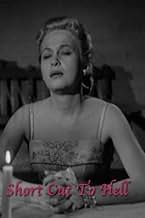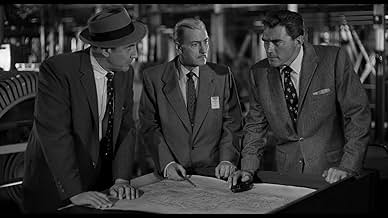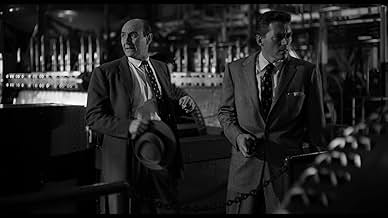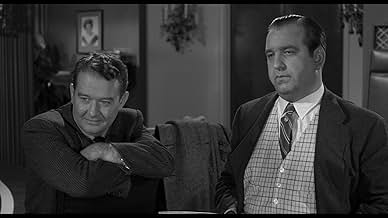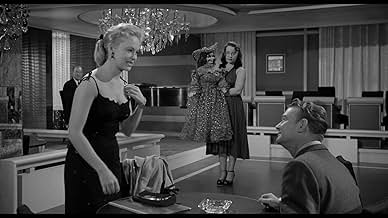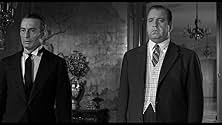Ajouter une intrigue dans votre langueA hired killer's latest contract goes awry when he's paid with stolen money and finds himself embroiled in a deadly cat-and-mouse game with those who hired him.A hired killer's latest contract goes awry when he's paid with stolen money and finds himself embroiled in a deadly cat-and-mouse game with those who hired him.A hired killer's latest contract goes awry when he's paid with stolen money and finds himself embroiled in a deadly cat-and-mouse game with those who hired him.
- Réalisation
- Scénario
- Casting principal
Larry Arnold
- Commuter
- (non crédité)
Roscoe Ates
- Road Driver
- (non crédité)
Joe Bassett
- Patrolman
- (non crédité)
Jacqueline Beer
- Waitress
- (non crédité)
Paul Bradley
- Train Passenger
- (non crédité)
James Cagney
- Self - Pre-credits sequence
- (non crédité)
Douglas Evans
- Mr. Henry
- (non crédité)
Joseph Forte
- Ticket Seller
- (non crédité)
Milton Frome
- LAPD Captain
- (non crédité)
James Gonzalez
- Train Passenger
- (non crédité)
Avis à la une
Robert Ivers ,mainly in the first part ,gives an impressive performance:impassive ,deadpan,cold as ice ,he will make you shiver with his robotic swagger.When he kills the secretary after her boss,the directing(and performance) seems years ahead of its time.Ditto for the scene in the restaurant where his "client" is savoring mint chocolates or later in the train where he meets the chanteuse.
The problem lies in this singer's character:the courageous young girl,who feels for the unfortunate killer who's got a raw deal,whose drunkard of a father treated him so bad he could be nothing but an outlaw etc etc etc.After an offbeat and intriguing first part,the movie turns predictable and the "moving" ending is business as usual.
The problem lies in this singer's character:the courageous young girl,who feels for the unfortunate killer who's got a raw deal,whose drunkard of a father treated him so bad he could be nothing but an outlaw etc etc etc.After an offbeat and intriguing first part,the movie turns predictable and the "moving" ending is business as usual.
This is the only film directed by James Cagney.
In Short Cut to Hell, Robert Ivers plays a hit man paid off with counterfeit money, bringing police to his door. He hops a train to Los Angeles and winds up kidnapping a young woman (Georgian Johnson) who is the girlfriend of a detective (William Bishop).
Very routine and I struggled to stay involved.
Growing up I loved the TV series It's a Great Life which starred Bishop. I suppose if I saw it now I would find it silly, who knows. Sadly he died young.
I had never seen Georgann Johnson as a young and pretty actress. She was a wonderfully talented character actress.
In Short Cut to Hell, Robert Ivers plays a hit man paid off with counterfeit money, bringing police to his door. He hops a train to Los Angeles and winds up kidnapping a young woman (Georgian Johnson) who is the girlfriend of a detective (William Bishop).
Very routine and I struggled to stay involved.
Growing up I loved the TV series It's a Great Life which starred Bishop. I suppose if I saw it now I would find it silly, who knows. Sadly he died young.
I had never seen Georgann Johnson as a young and pretty actress. She was a wonderfully talented character actress.
Short Cut to Hell (1957)
A strained effort all around, including James Cagney giving a personal introduction standing next to an imposing movie camera, assuring us his two new leading actors were terrific, before we get a chance to see for ourselves. We can wonder about his motivations, but on the surface two things seem clear. One, he's trying to move from being an actor to being a director (he sort of says he's getting too old to act, interestingly). And two, he's going about it in a cheap and sort of safe way, as if Hollywood knew it wasn't going to go very far.
The result is pretty awful in enough ways to say you might just skip it. I'm a junkie for noir films, and "This Gun for Hire" is a true, early, formative classic from 1942. That one, with Alan Ladd in the lead, and Veronica Lake and Laird Cregar as support, is terrific in all the little ways that add up to something uniquely memorable, even in the hands of little known director Frank Tuttle. Now, fifteen years later, Cagney in his first and last directorial effort, remakes Tuttle's version. He sometimes matches it scene for scene (a few curious substitutions, like an air raid shelter instead of an empty railroad car) and actor for actor (the man taking Cregar's role seems to be vainly imitating him). And he leaves out a few of the key quirks that made the original more, well, original and disturbing (like Ladd's relationship to cats).
One stark difference is the different kind of female character Cagney casts, avoiding the sultry version of Veronica Lake for a very Doris Day kind of lead. And it's probably telling that these terrific new actors Cagney is using had very little in the way of careers after this. Cagney did act in a few more films, living until 1986.
If you have little patience, I think you might not make it through the first painful scene of a woman overacting her weariness in the motel hallway, but that's not fair. It does have faster and more interesting moments. In general, the filming and lighting has brightened up, losing at least the noir visual quality, maybe keeping its tonal range in line for television rebroadcast (an important concern by the late 1950s).
If you want to know the possibilities of the story at its best, start with Graham Greene's 1936 book (A Gun for Sale) and then to the seminal 1942 movie. Short Cut to Hell is an asterisk at beset, a curiosity.
A strained effort all around, including James Cagney giving a personal introduction standing next to an imposing movie camera, assuring us his two new leading actors were terrific, before we get a chance to see for ourselves. We can wonder about his motivations, but on the surface two things seem clear. One, he's trying to move from being an actor to being a director (he sort of says he's getting too old to act, interestingly). And two, he's going about it in a cheap and sort of safe way, as if Hollywood knew it wasn't going to go very far.
The result is pretty awful in enough ways to say you might just skip it. I'm a junkie for noir films, and "This Gun for Hire" is a true, early, formative classic from 1942. That one, with Alan Ladd in the lead, and Veronica Lake and Laird Cregar as support, is terrific in all the little ways that add up to something uniquely memorable, even in the hands of little known director Frank Tuttle. Now, fifteen years later, Cagney in his first and last directorial effort, remakes Tuttle's version. He sometimes matches it scene for scene (a few curious substitutions, like an air raid shelter instead of an empty railroad car) and actor for actor (the man taking Cregar's role seems to be vainly imitating him). And he leaves out a few of the key quirks that made the original more, well, original and disturbing (like Ladd's relationship to cats).
One stark difference is the different kind of female character Cagney casts, avoiding the sultry version of Veronica Lake for a very Doris Day kind of lead. And it's probably telling that these terrific new actors Cagney is using had very little in the way of careers after this. Cagney did act in a few more films, living until 1986.
If you have little patience, I think you might not make it through the first painful scene of a woman overacting her weariness in the motel hallway, but that's not fair. It does have faster and more interesting moments. In general, the filming and lighting has brightened up, losing at least the noir visual quality, maybe keeping its tonal range in line for television rebroadcast (an important concern by the late 1950s).
If you want to know the possibilities of the story at its best, start with Graham Greene's 1936 book (A Gun for Sale) and then to the seminal 1942 movie. Short Cut to Hell is an asterisk at beset, a curiosity.
Story about an antisocial hired killer who goes after an employer who double crosses him. While tracking down the men who hired him he gets involved with the female lead a night club singer on her way to Los Angeles. In the end revenge is extracted.
It is fast paced and keeps your interest especially the first hour. When the action moves to LA it starts to bog down a bit and get a little squirrelly. There is a long scene in an air raid shelter of some huge giant factory that is completely implausible...dozens of police scour the plant for hours but overlook an obvious staircase to the airraid shelter??
Still it is worth a watch I give it a 6.
The other reviews are by people much more knowledgeable about the actors and period than I...am reviewing it as a naive uninformed viewer.
RECOMMEND
It is fast paced and keeps your interest especially the first hour. When the action moves to LA it starts to bog down a bit and get a little squirrelly. There is a long scene in an air raid shelter of some huge giant factory that is completely implausible...dozens of police scour the plant for hours but overlook an obvious staircase to the airraid shelter??
Still it is worth a watch I give it a 6.
The other reviews are by people much more knowledgeable about the actors and period than I...am reviewing it as a naive uninformed viewer.
RECOMMEND
Towards the end of Short Cut to Hell, with the two principal characters holed up in an abandoned underground storage bunker and the police cars massed outside, there's a long quotation from the doom-freighted score Miklos Rosza wrote for Double Indemnity. It's one of several arresting details the movie provides (another is a newspaper from the previous decade, with the headline 'Allies Cross Siegfried Line'), details that pique interest but go nowhere in attempting to satisfy curiosity.
Short Cut to Hell is an all but forgotten movie but a noteworthy one nonetheless, if only as the only title James Cagney ever directed. Night of the Hunter it's not (the sole directorial effort of Charles Laughton), but another point of engagement is in its being a remake of the 1942 Alan Ladd/Veronica Lake vehicle This Gun for Hire, drawn from the Graham Greene 'entertainment' of that name.
The Ladd/Lake allure didn't last into a new millennium (who knew?), but in 1957 both of them were still reasonably active, their less than glamorous (all right, alcoholic) endgames still a few years, or decades, off. Cagney chose to update them using actors without much in the way of either past or future.
In the Ladd role of the icy, isolated killer-for-hire, Robert Ivers is little more than a trenchcoat and a topper, skin and bones, who brings to mind an unlikely amalgam of Elisha Cook Jr. and James Dean. Finding himself set up through marked bills, after carrying out the two brutal murders contracted by pompous 'fatso' (Jacques Aubuchon, whose indulgences are pretty young things and peppermint patties), he eludes police, taking as hostage Georgann Johnson, a lounge singer engaged to police detective William Bishop.
Johnson proves a game gal, but in the wrong way. She has a way with a wisecrack, but it's not in the flirtatious Veronica Lake way (nor that of Lauren Bacall or Gloria Grahame); the spin she gives is more in the Eve Arden-ish, vinegar-virgin mode, less seductive than matey, even matronly. So the chemistry between captor and captive (our old friend The Stockholm Syndrome) rarely reaches reactive force. (Nor, for that matter, do the reactions between Johnson and Bishop.)
Notwithstanding its unknown cast, Short Cut to Hell doesn't have the look or feel of a B-movie, and Cagney keeps a good pace and an acceptable amount of tension (a few quite brutal scenes help to quicken the pulse as well). It's not quite clear why Cagney chose this material to direct, and he makes (or had to accept) some less than ideal choices, but he'd worked in movies long enough to insure that the movie he directed was brisk and absorbing, a better little movie than its obscurity might suggest.
Short Cut to Hell is an all but forgotten movie but a noteworthy one nonetheless, if only as the only title James Cagney ever directed. Night of the Hunter it's not (the sole directorial effort of Charles Laughton), but another point of engagement is in its being a remake of the 1942 Alan Ladd/Veronica Lake vehicle This Gun for Hire, drawn from the Graham Greene 'entertainment' of that name.
The Ladd/Lake allure didn't last into a new millennium (who knew?), but in 1957 both of them were still reasonably active, their less than glamorous (all right, alcoholic) endgames still a few years, or decades, off. Cagney chose to update them using actors without much in the way of either past or future.
In the Ladd role of the icy, isolated killer-for-hire, Robert Ivers is little more than a trenchcoat and a topper, skin and bones, who brings to mind an unlikely amalgam of Elisha Cook Jr. and James Dean. Finding himself set up through marked bills, after carrying out the two brutal murders contracted by pompous 'fatso' (Jacques Aubuchon, whose indulgences are pretty young things and peppermint patties), he eludes police, taking as hostage Georgann Johnson, a lounge singer engaged to police detective William Bishop.
Johnson proves a game gal, but in the wrong way. She has a way with a wisecrack, but it's not in the flirtatious Veronica Lake way (nor that of Lauren Bacall or Gloria Grahame); the spin she gives is more in the Eve Arden-ish, vinegar-virgin mode, less seductive than matey, even matronly. So the chemistry between captor and captive (our old friend The Stockholm Syndrome) rarely reaches reactive force. (Nor, for that matter, do the reactions between Johnson and Bishop.)
Notwithstanding its unknown cast, Short Cut to Hell doesn't have the look or feel of a B-movie, and Cagney keeps a good pace and an acceptable amount of tension (a few quite brutal scenes help to quicken the pulse as well). It's not quite clear why Cagney chose this material to direct, and he makes (or had to accept) some less than ideal choices, but he'd worked in movies long enough to insure that the movie he directed was brisk and absorbing, a better little movie than its obscurity might suggest.
Le saviez-vous
- AnecdotesJames Cagney's only directorial effort.
- Citations
[Kyle just told Glory that he's a professional killer]
Glory Hamilton: Is there anything you like about yourself?
Kyle: Yeah. I never miss.
- ConnexionsReferenced in Here's Lucy: Lucy and Carol Burnett (1971)
- Bandes originalesI'm in the Mood for Love
(uncredited)
Music by Jimmy McHugh
Lyrics by Dorothy Fields
Performed by Danny Lewis
Meilleurs choix
Connectez-vous pour évaluer et suivre la liste de favoris afin de recevoir des recommandations personnalisées
- How long is Short Cut to Hell?Alimenté par Alexa
Détails
- Date de sortie
- Pays d’origine
- Langue
- Aussi connu sous le nom de
- Short Cut to Hell
- Lieux de tournage
- Société de production
- Voir plus de crédits d'entreprise sur IMDbPro
- Durée1 heure 29 minutes
- Couleur
- Rapport de forme
- 1.85 : 1
Contribuer à cette page
Suggérer une modification ou ajouter du contenu manquant


